WITNESS
★ ★ ★ ★
By Dee Mulrooney
I have been defining, and redefining, the word ‘home’ for over 42 years.
Home is family
As early as I remember my home was very important to me, I loved the walls I dwelled in and I could imagine no other place so safe and warm. Our three-bedroomed terraced house in a working-class suburb of North Dublin was my palace. It was where I could fully be myself and I was loved unconditionally. I daydreamed about living next door to my parents with my own children. I felt proud and confident about where I was from and the home my parents had created for my brothers and me.
As I became a teenager this all changed. A growing unease began to seep its way into my everyday existence. I began to criticise the bi-annual new wallpaper and paint job that my parents thought were lovely. Sunday evenings with ‘Songs of Praise’ and ‘The Antiques Roadshow’ made me feel suffocated and bored. I started smoking my mother’s cigarettes, motivated by the fact that she would have ‘killed’ me had she found out. I determined that I would never live where I grew up.
Home is safety
When we got married, my husband and I lived in an inner-city social housing complex. We loved it. Thinking about it now still provokes sentimentality. We lived there for 8 years but as soon as our first son was born everything changed. It was like I put on a pair of glasses that made everything look harsh and cruel. I knew I could not raise my son in the environment we were living in. The reality of inner-city life, homeless people and drug addicts shooting up now seemed to rip through my heart. I wanted peace, sky, beauty, for my son. I wanted the place where I grew up, I wanted to live beside my parents. Then through a curious twist of fate, when our second son was four, it happened. We moved into a house right beside my parents. I thought it would it would be our home forever.
However, fate had other plans for me. Three years later our landlord decided he wanted his house back and within the few short years we had been living there we were priced out of the market. It felt like we had no chance of ever securing a family home.
Home is our heart
As we made our decision to move to Berlin I redefined home over and over again in my head. We had had a romantic love affair with the city, spending every summer for seven years there. I decided to have a mid-life revolution instead of a crisis, and pledged to never again to make a place my home. We left our forever-house on bittersweet terms in July 2015 and made what became a pilgrimage to our new life in Berlin. For the first time in my life I had no idea what would happen next. We had dreams and some savings but the rest we left to chance.
I held courage and fear in equal measure on leaving my home place, my family of origin, my tribe. I took courage in my own strength to make a new life in Berlin, but I also feared that I would somehow damage my kids in the process. When I was their age, leaving a safe, loving home environment would have been an anathema to me. It is this insecurity that inhibits my daily happiness now, but I work hard to carve out respite from my fear and anxiety.
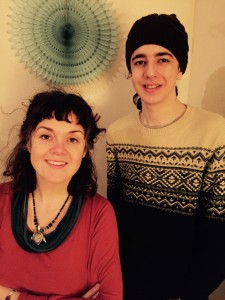
Home is refuge
An unlikely place where I feel some respite from my own inner worrier is the migrant centre I visit every Sunday. I started a project working with migrants in early December. I ‘collect’ their stories with the assistance of a young Syrian man named Fareed. We became an unlikely duo when he asked me in a German class we were taking together, to correct a poem he had written in English. His mother tongue is Arabic but he has excellent English. I was immediately inspired and thought about storytelling and art. Both Ireland and Syria have a long tradition of oral history, something ancient yet familiar instinct awoke in me.
Hearing these stories has filled me with both horror and hope. Migrants have made unspeakable journeys in order to seek refuge. Some of them have found this, but not one has found ‘home’. They tell me how quickly everything was gone, the shock of the loss still in their eyes. Sometimes they show me before- and after-pictures on their smartphones of their homes. One father of six said his whole town has disappeared from Google Maps.
The sense of displacement these people feel is palpable. I see how families try their best to carve out some sense of ‘home’ in the overcrowded centre, makeshift dividers, sheets, cots turned sideways to mimic walls. I can see fatigue and frustration creeping in as the weeks and months pass by and people still don’t have their visas. I have shared my own thoughts on home, I tell them what I tell my boys – ‘home is in our heart, home is where the people you love are, home is our little blue planet, home is not a place’.
Home is belonging
With permission I share these stories with my ex colleagues in Newpark Comprehensive School in Ireland, who then share them with their students. The stories promote dialogue and the students respond through poetry and art. I will travel to Ireland to speak directly with the students, to further engage and ask questions. I have also shared the stories with professional artists and poets with resoundingly positive response. The result of this ‘Creative Engagement’ will be a book called Witness, the proceeds of which will go towards establishing Arts-based projects with migrants here in Berlin.
Stories endure, the act of listening to my fellow human beings, bearing witness to their tales has had a profound impact on my sense of belonging. Though the path of my new life in Berlin is still unclear, my purpose with the migrants is crystal clear. Where the only agenda is to be present, listen and record, I have found it easy to connect with people, to love them, to feel at home.
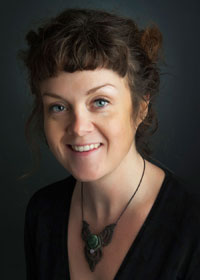
Dee Mulrooney is an artist, storyteller and educator. She lives with her family in Berlin, Germany.
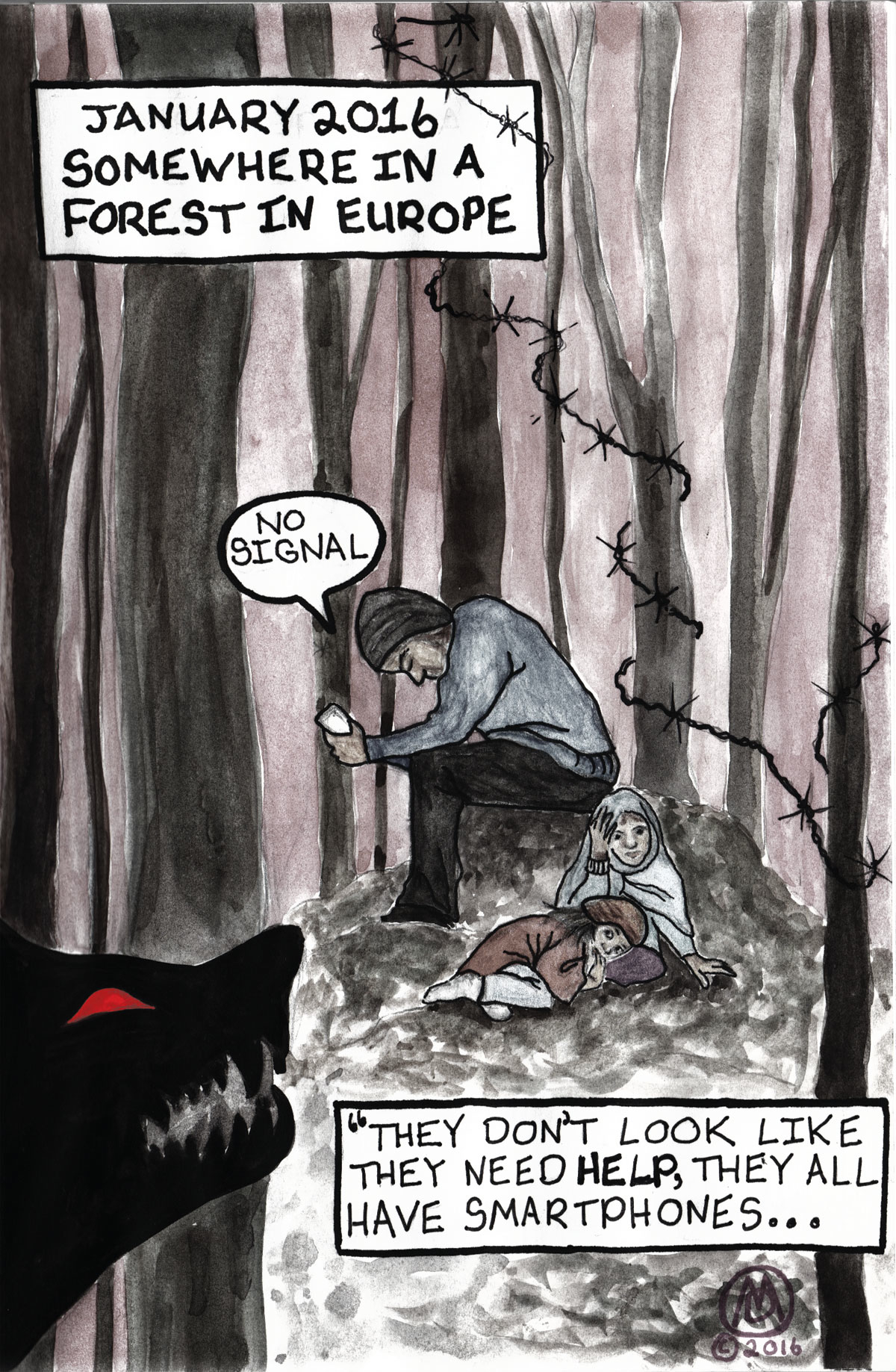
‘THE WAITING WOLF’
This political cartoon is based on true stories I’ve heard directly from migrants that have made the perilous journey with their families through dark forests in Europe. Mobile phones have saved countless lives during this crisis, but they have also failed miserably at crucial moments. This tool of technology has been effective, but is ultimately powerless against the bigger ‘beast’ that continues to hunt these people down.

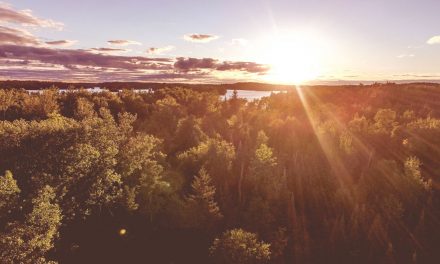
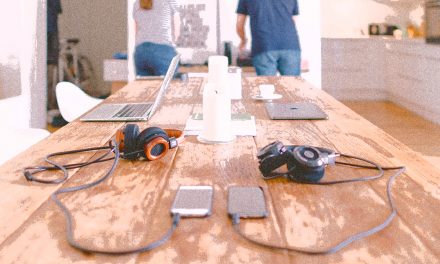
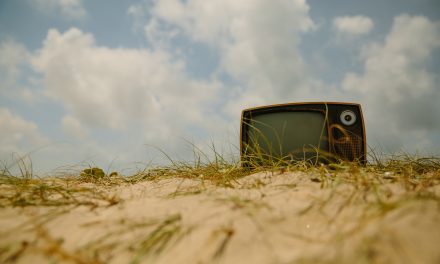

Thank you for this important work. These stories need to be told for so many reasons!